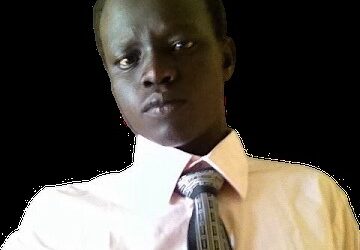By Ustaz Mark Bang
We have to keep in mind that those who reject the state of others’ slavery do so only when one has knowledge. This means that the pursuit of knowledge is an all-or-nothing proposition. You have to see it all, or you run the risk of simply imposing your personal view on reality. That imposition is, of course, the same as delusion, no matter how successful you are in life.
Most of my friends’ feeds are peppered with the saying, “You have to make the choice to be happy and see the good in things!” I don’t argue with them, but I would question their estimation of “good” and “beauty.” And I would do that simply because, after looking at the bad long enough, you begin to see hints of things that are generally too big for any one person to see. It turns out that in some cases, the “ugly” is not ugly at all, and in many cases, it is a direct result of our popular beliefs about beauty.
I would argue that you have to see all of it, to take in all of reality without judgement, in order to accurately perceive. It is such a being that is smitten and blasted. The first work of slavery is to mar and deface those characteristics of its victims that distinguish men from things and persons from property. Its first aim is to destroy all sense of high moral and religious responsibility. It reduces the young man to a mere machine. It cuts him off from his Maker, hides from him the laws of God, and leaves him to grope his way from time to eternity in the dark, under the arbitrary and despotic control of a frail, depraved, and sinful fellow man.
At first glance, it appears as a stab at anyone who deems education worthy of their time. However, the quote completely disregards those who put their education to the test and make use of it—the quote says “A learned man is an idler” [emphasis added], but anyone with an education who goes out and does something with it is obviously not an idler. Someone with an education who’s done nothing to personally verify what they’ve been taught is a questionable source of information. While they have no doubt possessed some valid information, they may also be gullible in possession of faulty information. If they’re idle about learning only from books (or—gasp—the internet), then they lack practice in discerning valid information from faulty.
Now, when it comes to certain information, it doesn’t take much work to discern its validity to a reasonable degree. I’m speaking specifically of scientific information: when one practices enough to be familiar with the scientific process and is critical enough to recognize when a finding is well-grounded in experimental data, then diligent study can be enough to provide reliably valid information. It is of the utmost importance, though, that the student has a good grasp of what constitutes reliable methodology and take with a grain of salt anything that does not explain itself accordingly. The core idea behind the quote is good, but the way it implies that a “learned man” cannot also be a practiced one is, well, faulty information.
Nor is slavery more adverse to the conscience than it is to the mind. The crime of teaching a slave to read is punishable with severe fines and imprisonment, and, in some instances, with death itself. The great mass of slaveholders looks upon education among the slaves as utterly subversive of the slave system. It is perfectly well understood in the South that to educate a slave is to make him discontented with slavery and to invest him with a power that shall open to him the treasures of freedom; and since the object of the slaveholder is to maintain complete authority over his slave, his constant vigilance is exercised. Education being among the menacing influences and, perhaps, the most dangerous, is, therefore, the most cautiously guarded against. As a general rule, then, darkness reigns over the abodes of the enslaved, and ‘how great is that darkness!
Throughout this life, one issue that we should understand as non-negotiable is that of universal education. Many philosophers have inquired about the origin and nature of slavery. Why am I a slave? Why some people slaves and others are masters? These were perplexing questions and very troublesome to my childhood. I was very early told by someone that ‘God up in the sky’ had made all things and had made black people to be slaves and white people to be masters. I could not tell how anybody could know that God made black people to be slaves. The answer is no, simply because one might choose to be a slave due to what he is in himself.
However, it’s important to develop a passion early on for reading, a passion that is ironically provoked by the debased ideas of others. The frequent hearing of my mistress reading the Bible aloud awakened the curiosity to this mystery of reading and roused in people the desire to learn. Up to this time, people should know nothing whatever of this wonderful art, and people ignorance and inexperience of what it could do for others, as well as our confidence in instructors, emboldened learners to ask teachers to teach how learners read.
Learned individuals are unique figures in the age-old struggle for civil rights. Those are principled fighters for the rights of all people throughout their entire lives. They start by identifying the unique quality of the human mind and the need to foster it through education. Those with credible knowledge refuse to talk down to their audiences; they learned to play the violin; they speak with great oratorical flourish; and they believe that the highest levels of classical culture are to be shared by all people.
Educated individuals’ attention to the development of the mind coheres with the thinking of the best country’s system proponents, who explicitly laid out the cultural parameters for economic progress. The educated economist should list specified the cultural contribution to advancing an economy by identifying a “capital of mind, in addition to the capital of nature (raw materials) and the capital of productive matter of man’s inventions of machinery. “Capital of mind” referred to the level of education and culture in the society and was the responsibility of government institutions because of its contribution to the productivity and prosperity of the society. “Public Staunchest Allies”
The writer of this article is a human rights activist, writer, and professional teacher.




